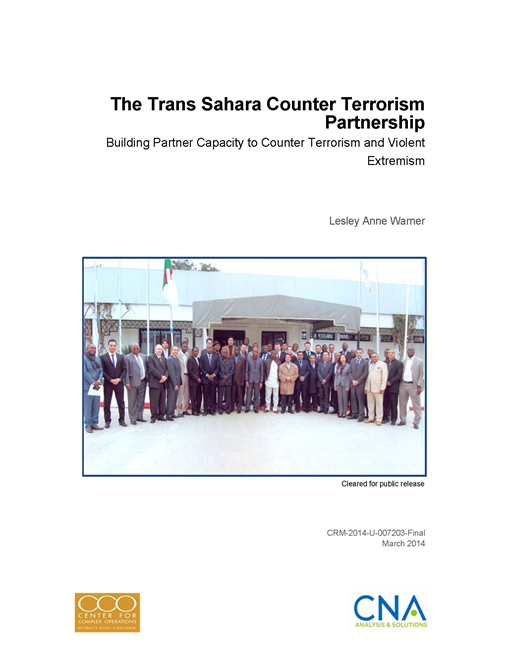The Trans Sahara Counter Terrorism Partnership (TSCTP) is a multiyear, interagency program to counter violent extremism (CVE) by building the resilience of marginalized communities so that they can resist radicalization and terrorist recruitment, and to counter terrorism (CT) by building long-term security force counterterrorism capacity and regional security cooperation. By U.S. government standards, TSCTP is an exceptional program for its ability to marshal interagency resources in support of a regional security approach that spans the “3Ds” – Diplomacy, Defense, and Development. The program covers ten countries in the Sahel and Maghreb: Algeria, Burkina Faso, Chad, Mauritania, Mali, Morocco, Niger, Nigeria, Senegal, and Tunisia.
This analysis was conducted during the 2013 interagency review of the U.S. government’s approach to stability in the Maghreb and Sahel, and a related TSCTP program review. A CNA analyst on assignment at the Center for Complex Operations (CCO) at National Defense University conducted not-for-attribution interviews of personnel from the headquarters level (U.S. government agencies) to the mission level (U.S. Embassy country teams) who are responsible for planning and implementing TSCTP activities, in order to understand the program’s strategy, coordination, successes, and failures. Six functional categories of TSCTP engagement were derived from these interviews, in order to conceptualize the program’s activities outside of traditional agency-specific stovepipes. They are:
- Military Capacity-Building: Training and equipping partner nations’ CT forces to monitor and control borders, and identify and react to the presence of terrorist groups in their countries.
- Law Enforcement Anti-Terrorism Capacity-Building: Enhancing the investigative abilities of partner nations’ law enforcement agencies and strengthening law enforcement personnel’s ability to protect critical infrastructure and secure borders against illicit trafficking.
- Justice Sector Counterterrorism Capacity-Building: Increasing partner nations’ judicial capacity to prosecute and imprison terrorists, improving prison management to counter prison radicalization, and countering transnational organized crime.
- Public Diplomacy and Information Operations: Working with partner nations to promote moderation and tolerance, counter violent extremist ideology, and encourage populations to report security threats to partner nation security forces.
- Community Engagement: Engaging key leaders and civil society organizations in partner nations to mitigate conflict and counter violent extremism, and delivering services to marginalized populations that may be vulnerable to terrorist recruitment.
- Vocational Training: Offering vocational training to the at- risk populations of partner nations, and increasing opportunities for social and economic inclusion in order to mitigate the recruitment of marginalized populations into terrorist organizations.
Since its inception in 2005 as an outgrowth of the Pan-Sahel Initiative (PSI), TSCTP has had some notable successes from the standpoint of U.S. government stakeholders – although these successes may be the result of correlation rather than causation. For example, while many African countries contributed troops to the African-led International Support Mission to Mali (AFISMA), Chad’s U.S.-trained Special Anti-Terrorism Group (SATG) was the only African force that took part in offensive operations to clear terrorist-occupied northern Mali in early 2013. Additionally, the case of Burkina Faso demonstrates the ability of the country team to link non-TSCTP and TSCTP engagement. The U.S. Embassy country team in Burkina Faso used Burkinabé alumni of the State Department’s Bureau of Educational and Cultural Affairs exchange programs to compensate for the withdrawal of Peace Corps volunteers from the Sahel region of that country, and subsequently as locally hired USAID staff for the implementation of Peace through Development II (PDEVII).
Download reportCleared for public release, distribution unlimited.
Details
- Pages: 104
- Document Number: CRM-2014-U-007203-final
- Publication Date: 3/31/2014
